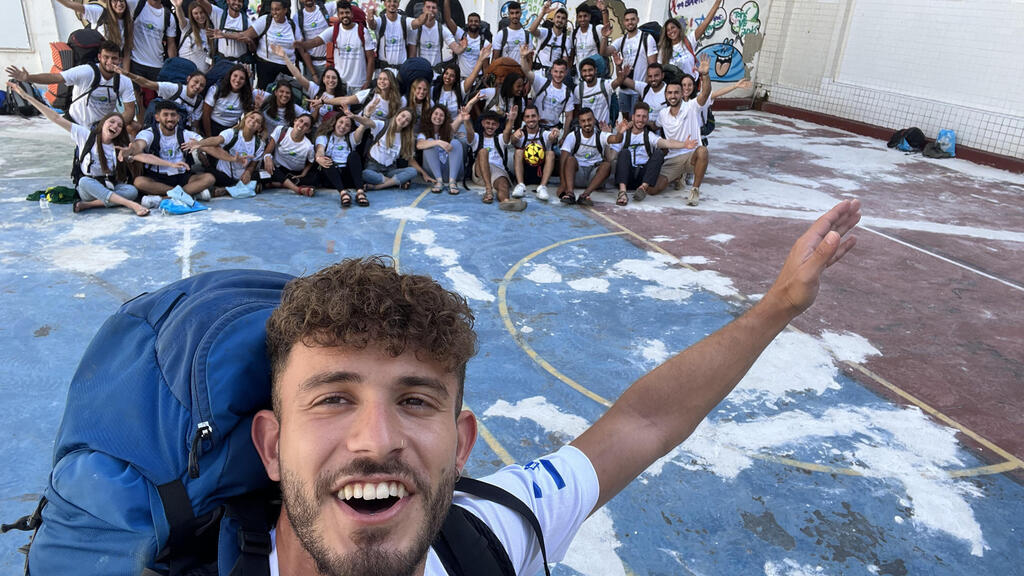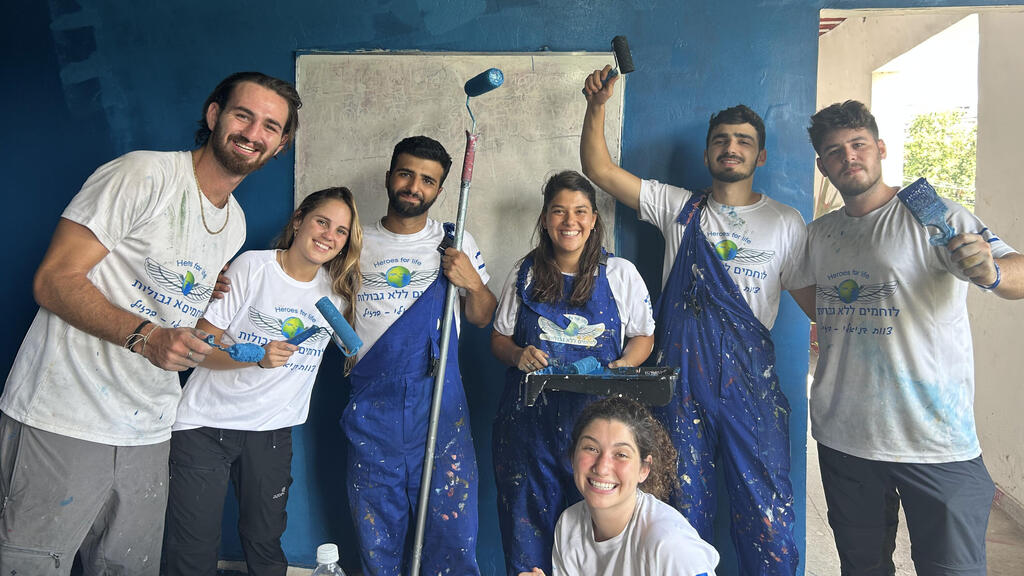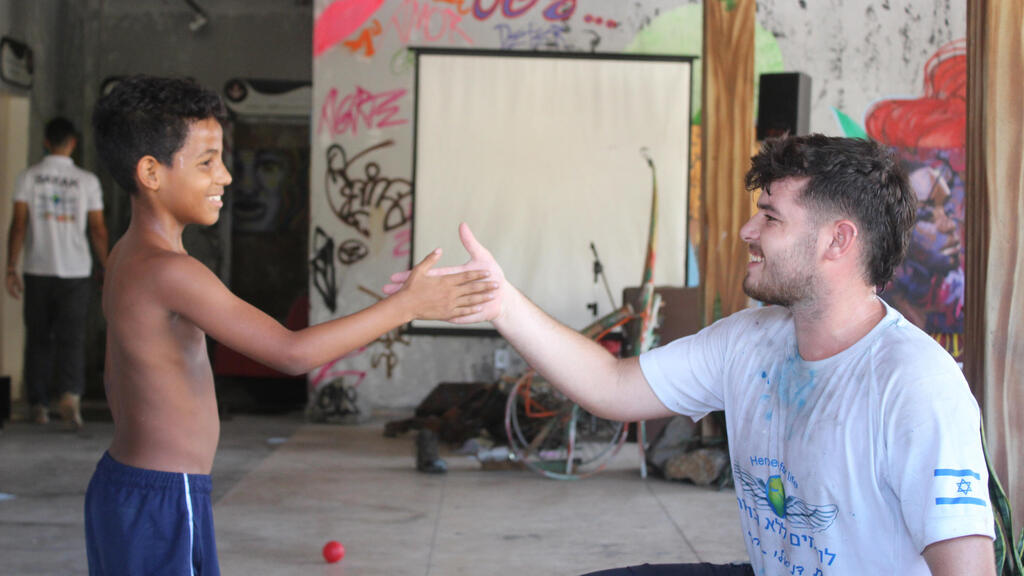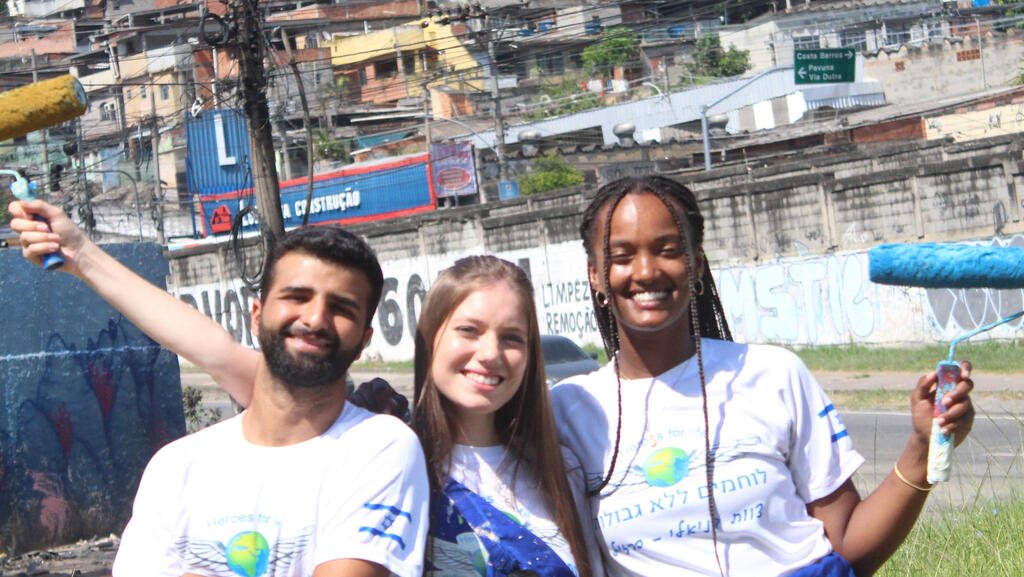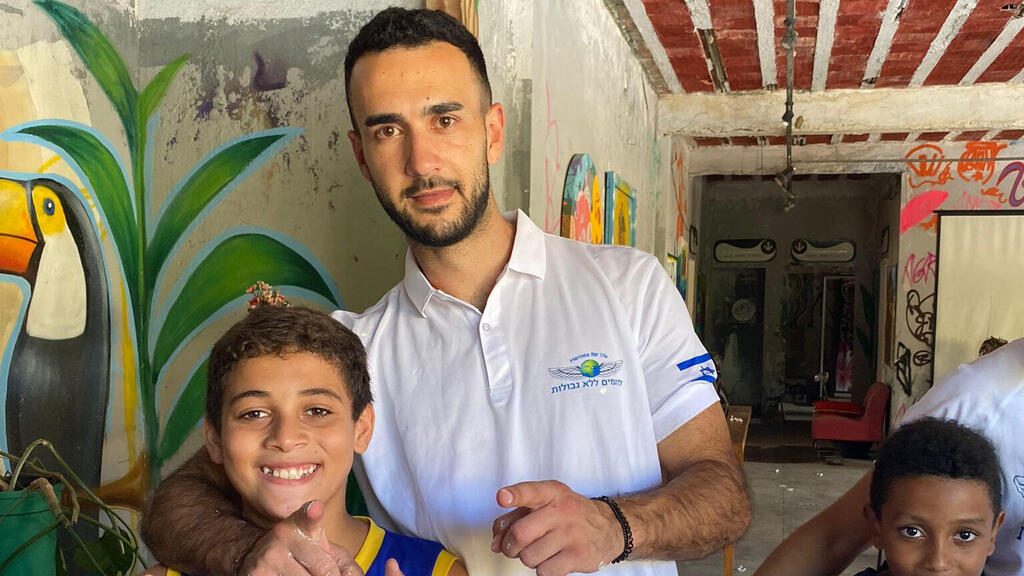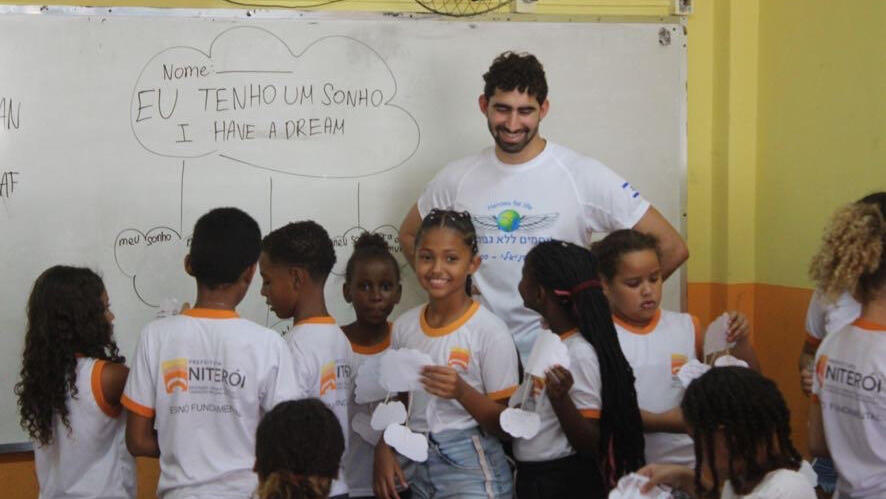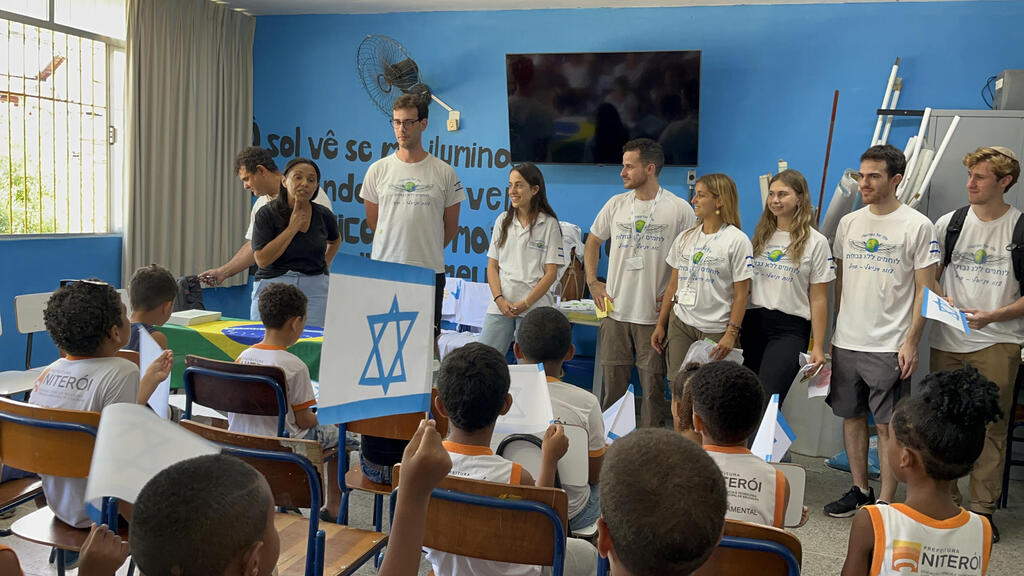Getting your Trinity Audio player ready...
Dozens of discharged Israeli soldiers arrive in Rio de Janeiro’s "Graffiti Museum" - a dilapidated building in one of the city’s multiple favelas – to volunteer at a museum that supports local children who were born into a life of poverty, living in shacks lacking sewage, running water, or electricity.
Related Stories:
Many of the children, who don’t attend school or any other educational framework, recognize the Israeli volunteers walking toward the building and join them.
Some don’t wear shoes, some are shirtless, and all of them are covered in grime and dust, staring in amazement at their new guests’ smartphones as they continue walking.
The Israeli volunteers came here as part of their work with the "Heroes for Life" organization, which recruits Israeli backpackers traveling in third-world countries for humanitarian causes.
Shirah, one of several Portuguese-speaking Israeli volunteers, approaches a group of thirsty children and attempts to offer them water from the tap when she’s stopped by an elderly woman who explains that the water drawn from there is sewage and not fit for drinking.
"It's sad. Water is one of the most basic necessities, and even that the children can't take for granted," she says.
The reality in Israel is complex and intricate. Alongside the conflicts and challenges the country has been facing in recent weeks, there are also clear, positive values that continue to lead future generations of Israelis who want to pass along whatever good things we can offer.
In recent weeks, dozens of volunteers fresh off their military service have traveled to poor neighborhoods and marginalized communities around the world in an attempt to spread hope.
Those who served in the most elite units, whose service is usually fraught with challenges and difficulties, saved every penny for their big trip following their service, but chose to stop everything for two weeks and devote themselves to volunteer work with communities that never heard about them or Israel before.
"The idea was born by chance," explains Major (res.) Gili Cohen, who founded the organization. After serving for many years in the IDF commando unit Duvdevan, Cohen left for his big trip at the behest of his family, despite being married and having his first child.
"We traveled to Thailand for two and a half weeks, and during the trip, I was surprised by the sheer number of Israelis there, and the Israeli presence could be felt wherever you went, like signs in Hebrew, Israeli food, and Thai people who understand the language," he says, also describing the less ideal sights he was exposed to during his trip: poverty, neglected children, and desperation.
"We saw orphanages with signs asking travelers passing by to volunteer for at least one day," he says. "On a Friday night, we went to the Shabbat dinner at a Chabad house in Ko Samui, where Israeli travelers were everywhere, and a unique connection was made between the veterans who had much to give, and a place that needed to receive help."
Cohen identified a rare and unexpected connection. Ten years later, it seems that he didn’t only found an organization, but also established a legacy. "I realized there was an opportunity there to make Israel a volunteering powerhouse for the benefit of others, and as a result, show the world the beautiful side of Israel and IDF veterans."
The organization doesn’t offer to finance the trip, nor does it organize attractive activities in far-off countries. In fact, it forces volunteers to face difficult conditions for 14 days of sleeping on damp mattresses in a small room at a Jewish community center, and working around the clock in neglected and sometimes even dangerous areas.
Despite that, 32,000 veterans have already participated in the activity to this day, 8,000 of them in 2022 alone. Heroes for Life is trying to raise more funds in an attempt to double the number of volunteers.
Shalom Corp is one of the organizations that help Heroes for Life. "We’re happy to cooperate and support the activities of Heroes for Life around the world. Through their help, we’re realizing our goals of bringing the Jewish Diaspora closer to Judaism and Israel through significant and influential volunteering."
Last month, 40 former soldiers arrived in Rio de Janeiro. They came from Bolivia, Argentina, and Salvador for two intensive weeks of community work in the favelas. They huddle in rooms assigned to them at the Jewish community center in Copacabana, and instead of planning the next route on their trip, they prepare lesson plans, draw the multiplication table, and prepare to clean and paint whatever’s needed.
Rabbi Tzipel, the center’s local rabbi and a former IDF paratrooper who arrived there as an emissary 18 years ago, says that the community members are happy to host the newly released soldiers every year and are glad for the opportunity to learn about Israel from them.
Volunteering is also devoted to educational activities with children from the favelas in the city. In the first part of their volunteer period, the veterans teach English, math, and personal hygiene. The second part is dedicated to improving the children’s living conditions.
At the train station, while waiting to arrive at Pavuna, one of Rio's most dangerous favelas, the volunteers share their excitement as they hold onto buckets of paint and large bristol papers.
"It's impossible to describe what we're seeing here," says Shira, one of the Israeli volunteers. She was an officer in charge of caring for wounded soldiers in her military service and dreamed of joining the organization’s mission.
"I heard about the mission from my sister who joined it in India and was shocked by the poverty and how little can be done for the children living there," she says.
Noa, who arrived after her service in a combat unit, tells about the local children's appreciation for spending time with Israeli volunteers. "They hug us, and they get excited. We do things with them that they wouldn't be able to experience otherwise, and most importantly, we give them hope," she explains.
Dedi arrived for his big trip after a long service as a commander in the IDF’s Golani Brigade. As he continues on his way to the remote school where he teaches, he says that although he’s far from home, he sympathizes with the children who receive his help.
"I grew up in southern Tel Aviv, in a tough neighborhood, and later volunteered to aid girls and boys from the same area. They talked about what living in such an environment does to you. I heard girls and boys talk about drugs, alcohol, or violence. They knew it wasn't good, but it was what they knew and there weren't many other options.
I remember that for me, it was a small and successful experience that made me feel like I could make a change, and that there was another way. That's also what I hope we'll be able to teach the children here,” he says.
The organization operates almost without any donations, with each mission dedicated to a fallen IDF soldier. Each mission is funded separately, usually by various sources, and mainly operates thanks to the soldiers who volunteer, assistance from Jewish communities, and embassies in different locations, which Cohen says are always willing to help.
In another small school nearby which the organization has helped for several years in a row, another volunteer team arrives. Captain (res.) Liran Ronen, the mission's director, says that there’s something heart-wrenching about coming there every year and seeing how some of the children lose their hope and innocence, looking at a 13-year-old girl in advanced pregnancy sitting on a bench in the schoolyard.
"After years of service in the IDF’s Armored Corps, I wanted to continue doing something meaningful," she says. "Before each mission, every soldier is required to volunteer in Israel first. We knew that we’d meet many children who had never been outside of the favelas and will look to us to show them something new and different."
Ronen is dedicated to the volunteers and takes care of every detail alongside her partner, Barak Choy who began volunteering in Zichron Yaakov. "COVID was active at the time, so the organization continued its work in Israel,” he says.
"We volunteered in community centers, renovated homes of Holocaust survivors, and made a difference. I felt it was one of the most meaningful weeks of my life." Later on, he also went to Brazil and continued aiding the mission ever since.
"There’s something about service in the IDF that inspires that feeling, especially if you feel like you’re doing something meaningful. This led me to want to continue doing these things even when I was done with my service."
At the school, Israeli volunteers are painting walls, and benches, and even working to illustrate a galaxy in one of the spaces. The children gather around them, stare, and wordlessly ask to participate.
One of the volunteers, who served in the elite reconnaissance unit Sayeret Matkal, immediately involves them, handing out brushes. Looking at both the volunteers and children, it’s clear that everyone is excited.
The others attend class in groups taught by three volunteers with a preplanned lesson plan. They stand before the class, which is captivated as the Israeli veterans draw clouds on the board with Martin Luther King's famous "I have a dream" quote.
When the volunteers ask them to draw their own clouds and write three personal dreams inside them, the students take the task seriously. Although it may seem like just another activity for young children in Israel, the task is a real challenge for them. They write in the clouds and raise their fingers to share their dreams.
After two weeks of volunteer work, veterans hold a farewell party at the school. As a sign of gratitude, the locals decorated the school with Israeli flags that the children had drawn and played Israel’s national anthem, “Hatikvah" (The Hope).
The children hugged the teary-eyed volunteers and struggled to say goodbye. "I believe in spreading light, no matter where," one of the veterans said. "Everyone should take some responsibility, not shy away from it, and we’ll be able to solve more problems. All it takes is for people to be responsible for a small part."
"Heroes for Life’s work has tremendous significance for all of us as Jews, Israelis, and human beings," says Major General (res.) Eliezer Shakedy, the organization’s president.
"The volunteers show the beauty of our country and people. They chose to add tremendous meaning to the meaning of true, humane, pure, and unconditional giving. You are what you’re willing to give."


